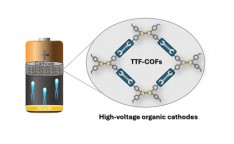abstract
Redox-active covalent organic frameworks (COFs) are promising electrode materials for metal-ion batteries owing to their tunable electrochemical properties, adjustable structure, and resource availability. Herein, we report a series of two-dimensional tetrathiafulvalene (TTF)-based COFs incorporating different organic linkers between the electroactive moieties. These COFs were investigated as p-type organic cathode materials for lithium-organic batteries. The electrical conductivity of both neutral and doped TTF-COFs was measured using a van der Pauw setup, and their electronic structures were investigated through quantum-chemical calculations. Binder-free buckypaper TTF-based electrodes were prepared and systematically tested as organic cathodes in lithium half-cells. The results revealed high average discharge potentials (similar to 3.6 V vs. Li/Li+) and consistent cycling stability (80% capacity retention after 400 cycles at 2C) for the three TTF-COF electrodes. In addition, the specific capacity, rate capability, and kinetics varied depending on the structure of the framework. Our results highlight the potential of TTF-COFs as high-voltage organic cathodes for metal-ion batteries and emphasize the importance of molecular design in optimizing their electrochemical performance. We report a series of 2D tetrathiafulvalene (TTF)-based COFs incorporating different organic linkers between the electroactive moieties that were investigated as p-type organic cathode materials for lithium-organic batteries.
keywords
NANOSHEETS
subject category
Chemistry; Energy & Fuels; Materials Science
authors
Valente, G; Dantas, R; Ferreira, P; Grieco, R; Patil, N; Guillem-Navajas, A; Miguel, DRS; Zamora, F; Guntermann, R; Bein, T; Rocha, J; Braga, MH; Strutynski, K; Melle-Franco, M; Marcilla, R; Souto, M
our authors
Groups
G1 - Porous Materials and Nanosystems
G3 - Electrochemical Materials, Interfaces and Coatings
G6 - Virtual Materials and Artificial Intelligence
Projects
CICECO - Aveiro Institute of Materials (UIDB/50011/2020)
CICECO - Aveiro Institute of Materials (UIDP/50011/2020)
Associated Laboratory CICECO-Aveiro Institute of Materials (LA/P/0006/2020)
Rede Nacional de Ressonância Magnética Nuclear (PTNMR)
Redox-active Metal-Organic Frameworks as Electrode Materials for Lithium-Ion Batteries (RedoxMOFs)
Collaboratory for Emerging Technologies, CoLab (EMERGING TECHNOLOGIES)
Other
Cover
Mediaacknowledgements
This work has received funding from the European Research Council (ERC) under the European Union's Horizon Europe Framework Programme (ERC-2021-Starting Grant, grant agreement no. 101039748-ELECTROCOFS). This work was developed within the scope of the project CICECO-Aveiro Institute of Materials, UIDB/50011/2020, UIDP/50011/2020, and LA/P/0006/2020, financed by national funds through the FCT/MEC (PIDDAC). The NMR spectrometers are part of the National NMR Network (PTNMR) and are partially supported by Infrastructure Project No. 022161 (co-financed by FEDER through COMPETE 2020 and POCI, PORL, and FCT through PIDDAC). We also thank FCT for funding the PTDC/QUI-ELT/2593/2021 and 2022.07534.CEECIND. G. V. and P. F. are grateful to FCT for their PhD grants (2020.08520.BD and UI/BD/151049/2021, respectively). This study was also funded by the PRR-Plano de Recuperac & atilde;o e Resiliencia and by the NextGenerationEU funds at the University of Aveiro through the scope of the Agenda for Business Innovation "New Generation Storage" (project no. 58 with the application C644936001-00000045). This work has received financial support from the Xunta de Galicia (Centro de investigacion do Sistema universitario de Galicia accreditation 2023-2027, ED431G 2023/03), the Oportunius program (Gain) and the European Union (European Regional Development Fund - ERDF). F. Z. acknowledges the support from the Spanish Ministry of Science, Innovation, and Universities through the "Maria de Maeztu" Programme for Units of Excellence in R&D (CEX2023-001316-M) and the financial support to the projects PDC2022-133498-I00, TED2021-129886B-C42, PID2022-138908NB-C31. Gratitude is also extended to the "(MAD2D-CM)-UAM" project funded by Comunidad de Madrid, the Recovery, Transformation, and Resilience Plan, NextGenerationEU from the European Union, and the European Innovation Council under grant Agreement 101047081 (EVA). T. B. acknowledges support from the SolTech network funded by the Free State of Bavaria, and funding from the Deutsche Forschungsgemeinschaft (DFG, German Research Foundation) under Germany's Excellence Strategy - EXC 2089/1 - 390776260. Authors also thank the European Union's Horizon 2020 research and innovation programme under the Marie Sk & lstrok;odowska-Curie Grant agreement (Grant No. 860403) and Spanish Government; MCIN/AEI/10.13039/501100011033/FEDER "A way of making Europe" (PID2021-124974OB-C21 and IJC2020-043076-I-I) for the funding.








